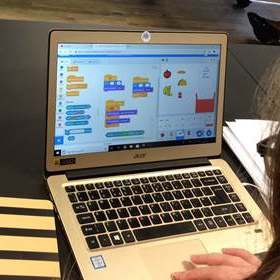Q: What’s the nature of your project and what are you looking to achieve?
go_girl code+create is a programme that works with disadvantaged young women who are NEET (not in education, employment or training). We help participants develop coding and digital skills while also addressing their social, emotional and psychological needs. This holistic approach helps to empower them and bring them back into education, employment or training and will help local authorities reduce the high number of NEETs that they would have to support in the long term.
go_girl code + create began as a research project in the Department of Education, University of Oxford and was the brainchild of Professor Niall Winters and Dr. Anne Geniets. It has been run in partnership with the Oxfordshire County Council for the last three years. Tracey Denton Calabrese and I are planning to turn this research programme into a social enterprise that expands into multiple Local Authorities across the UK and eventually into other organizations that work with young women who are NEET or at risk of becoming NEET.
Q: What’s your background and why did you decide to focus on this idea?
I am a Biomedical Engineer by training, and am currently completing my PhD at the Department of Education, University of Oxford. I am passionate about the development of digital and STEM skills in young women and have seen firsthand the fantastic results that go_girl has achieved with the young women who have participated in terms of digital, social, emotional and psychological empowerment. Both my co-founder (Tracey) and I feel that the holistic approach of the programme helps create the confidence, resilience and spirit that is required for the young women to move from NEET to EET (education, employment, or training).
Q: What are you hoping to get out of the SUCCESS programme?
We are hoping to tap into the extensive, collective knowledge held across the participating universities in the SUCCESS programme to learn more about developing an enterprise that has a strong social focus. We hope to have developed a sustainable venture on the other side of this programme.
Q: What has been the most useful part of the SUCCESS programme?
So far I have completed the 3-day BOOTCAMP and I am already blown away by the wealth of knowledge and connections that we will be able to access and take advantage of over the course of the SUCCESS programme.
Q: What have you learned through the programme that you will bring back to your research?
In future studies of the programme, it will be useful to capture longer term (beyond our current strategy) longitudinal qualitative and quantitative data with a goal of understanding participant experiences over time, particularly in terms of their social mobility and career trajectories.
Subscribe to the Aspect newsletter to receive regular news and insight from the programme.




